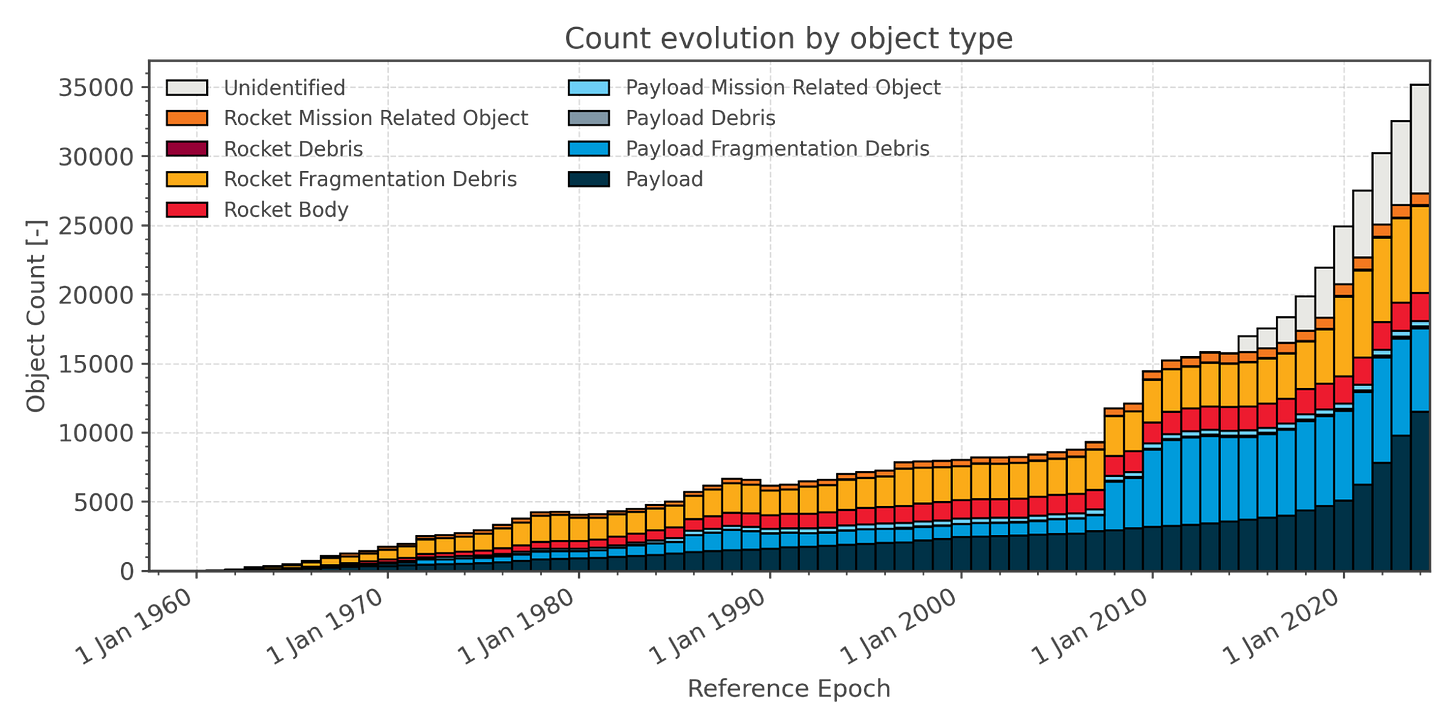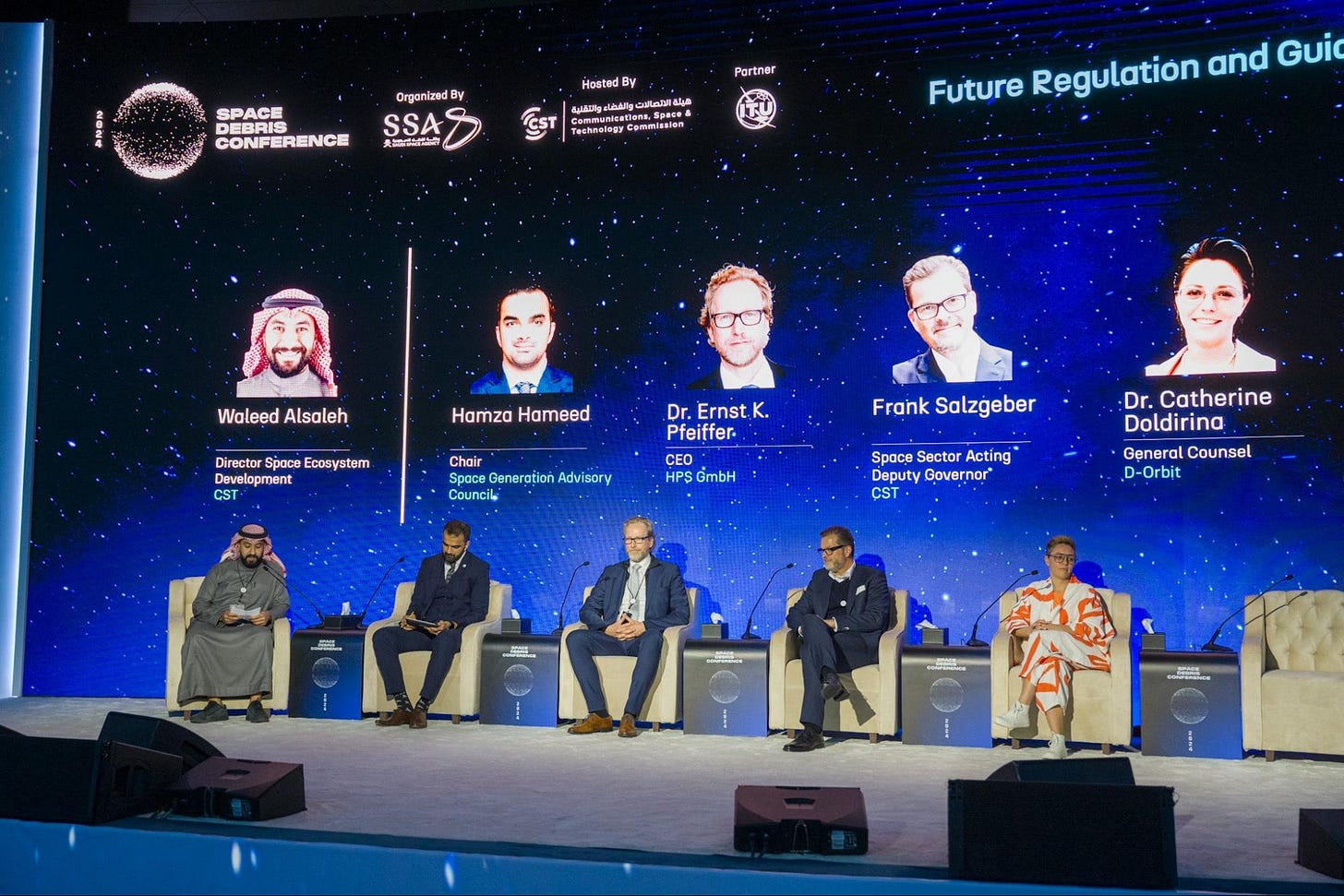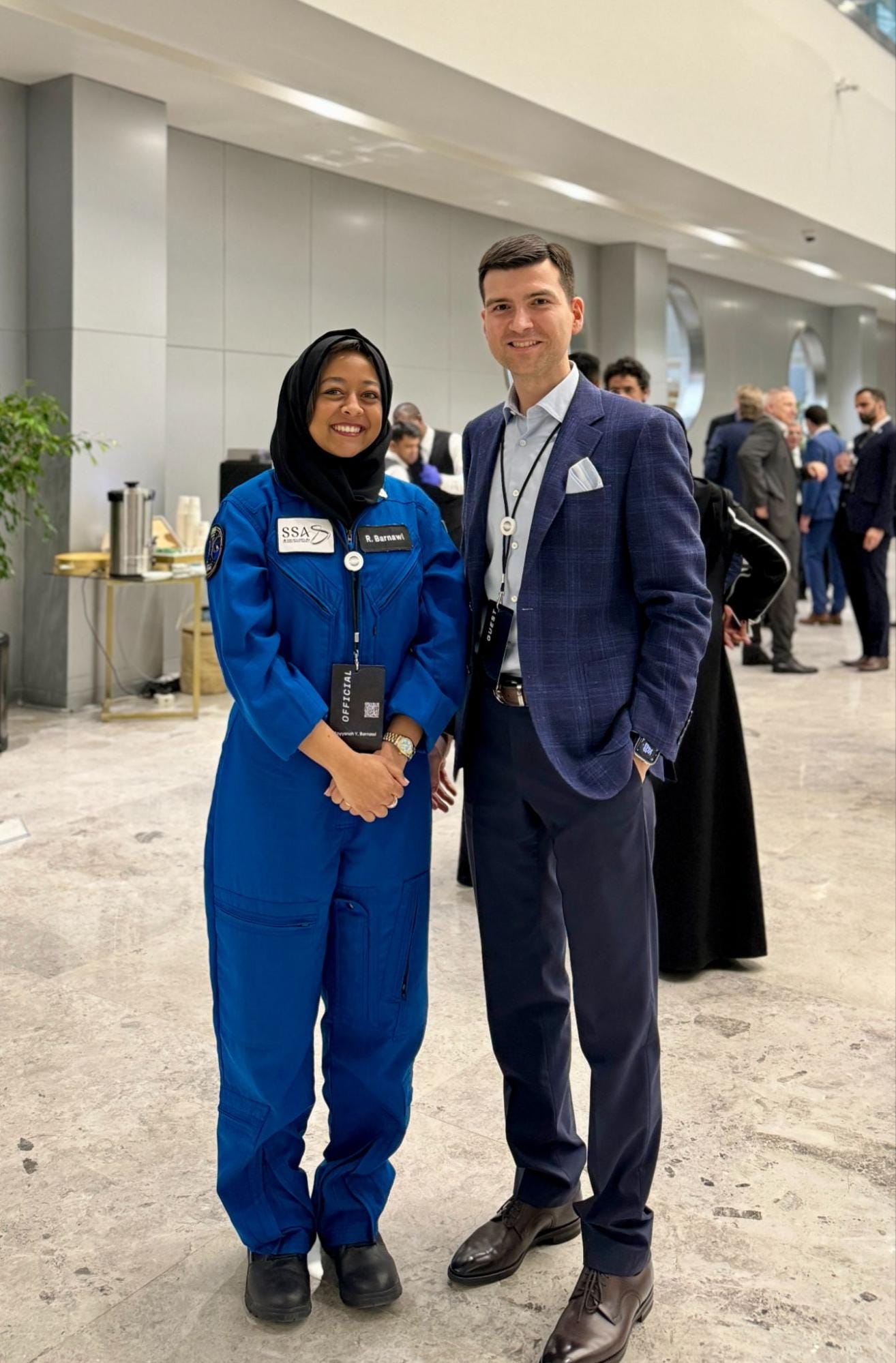Space Debris: the Global Flagship Conference Takeaways from Saudi Arabia
As humanity launches more satellites the problem of space debris becomes more urgent. We’d like to share with you the insights from the leading space debris conference which took place in Saudi Arabia
Issue 74. Subscribers 11 134.
Unlock exclusive access to our handpicked selection of top deep tech investment syndicates, premier space conferences, and a comprehensive list of space investors and accelerators. More information here.
We teamed up with Viktor Shpakovsky, who attended Saudi Arabia's Space Debris Conference, to share recent space tech developments in the country. He was one of our first readers and supporters, so we are absolutely thrilled to publish his piece in the blog.
The Kingdom Hosts Region's First Space Debris Conference with Over 50 Countries in Attendance
The Space Debris Conference, themed "Towards Securing the Future of the Global Space Economy," commenced in Riyadh on the 11th and 12th of February 2024. The conference was attended by the Chairman of the Board of Directors of the Saudi Space Agency, Engineer Abdullah bin Amer Al-Swaha, the CEO of the Saudi Space Agency, Dr. Mohammed bin Saud Al-Tamimi, the Secretary-General of the International Telecommunication Union "ITU", Doreen Bogdan Martin, and the Director of the United Nations Office for Outer Space Affairs "UNOOSA", Aarti Holla-Maini.
Notable attendees included representatives from prominent global space agencies such as the UAE Space Agency, Egyptian Space Agency, Japan Exploration Space Agency, NASA, and the National Space Science Agency. Over 30 key industry players like Axiom Space, Leo Labs, Orbit Fab, Astroscale, and others, accompanied by more than 260 experts, and delegates from over 50 countries were also present.
Space Debris: A Growing Challenge in Earth's Orbit
We have already talked about the problem of space debris in one of our previous article. Today we’d like to expand on the topic. Since the dawn of the space age in 1957, humanity has made significant strides in exploring the cosmos, with approximately 6,500 rocket launches marking our journey into space. These launches have facilitated the deployment of roughly 16,990 satellites into Earth's orbit, revolutionizing communication, navigation, weather forecasting, and numerous other aspects of modern life.
However, as space activity has intensified, so too has the accumulation of space debris – defunct satellites, spent rocket stages, and other fragments left behind by missions past. Of the nearly 16,990 satellites launched, approximately 11,500 remain in orbit, with around 9,000 of them still functioning as intended. Unfortunately, the remaining objects have contributed to the formation of a vast cloud of space debris that poses a growing threat to operational spacecraft.
Space Surveillance Networks diligently track and catalog debris objects, with over 35,150 currently monitored. Yet, this figure only scratches the surface of the true extent of space debris. More than 640 incidents like break-ups, explosions, collisions, or other anomalous events have occurred, further exacerbating the issue.
The total mass of all objects in Earth's orbit exceeds 11,500 tonnes, a staggering accumulation of human-made materials suspended in space. Despite the efforts of surveillance networks, many debris objects evade detection and remain untracked, posing a hidden hazard to spacecraft and astronauts.
Statistical models provide estimates of the vast quantities of debris present in orbit. According to projections, there are approximately 36,500 space debris objects larger than 10 cm, over 1,000,000 objects ranging from 1 cm to 10 cm, and a staggering 130 million objects between 1 mm and 1 cm in size. These smaller fragments, while less visible, present a significant risk due to their high velocity, capable of causing catastrophic damage upon impact.
SpaceX's Starlink satellites had to perform 25,000 collision-avoidance maneuvers within a span of just 6 months, indicating a concerning trend that is expected to be exacerbated in the future.
The Kessler Syndrome refers to a phenomenon where the accumulation of space debris in Earth's orbit reaches a critical threshold, leading to a cascade effect of collisions and generating further debris. This escalating debris poses significant challenges for satellites, astronauts, and mission planners alike and potentially can close access to space for the next generations.

Addressing the issue of space debris requires a concerted global effort, combining technological innovation, regulatory frameworks, and collaborative initiatives. As humanity continues to push the boundaries of space exploration, safeguarding Earth's orbital environment is paramount to ensuring the long-term sustainability of space activities and the preservation of our cosmic heritage.
Spotlight on Key Sessions and Keynote Presentations: Highlights from the Conference
We have talked in our previous article that 12 startups raised Series A+ funding in 2023 alone to deal with space debris and orbital maneuvering. We believe that as this topic becomes more urgent, so does the need to host a space debris conference.
We wish to emphasize the most significant sessions and keynote presentations from the conference.
The session, hosted by the United Nations Office for Outer Space Affairs under the title "Transforming Policies for Progress" underscored the office's objectives, which include seeking innovative technologies to address the issue of space debris, harnessing Earth's magnetic fields, and exploring other potential solutions. Despite the challenges posed by space debris, which could jeopardize space crews, vehicles, and satellites, environmental experts suggested that the reentry of satellites into Earth's atmosphere does not pose significant climatic or environmental threats.
Representatives from the office emphasized the principle of equitable access to space for all, stressing the imperative of cooperation for the collective benefit of humanity. They called for concerted efforts during the conference to establish legislation and international agreements ensuring responsible space utilization. Additionally, they highlighted the importance of long-term sustainability, emphasizing the need to bolster capacities to support national and international initiatives and raise awareness to mitigate space debris accumulation.
During the keynote speech titled "Space Debris Today and Opportunities Tomorrow" Michael Suffredini, co-founder and CEO of Axiom Space, emphasized the challenges posed by space debris and the importance of addressing them. He commended the Saudi Space Agency for organizing the conference and raising awareness about the issue, advocating for regulations and increased tracking of space debris.
Dr. Marshall Kaplan, Principal of LaunchSpace Services, delivered the keynote speech, addressing "Space Debris Challenges and Sustainability". He proposed collaborative international workshops with the Saudi Space Agency to foster innovation in developing technologies for orbit cleanliness and mitigating debris-related issues. Kaplan recommended prioritizing equatorial orbits for cost-effective disposal of smaller debris and emphasized the necessity of cleaning polar orbits while avoiding heavily polluted ones during future launches.
Highlighting the significance of international cooperation, Kaplan advocated for governmental and commercial space entities to join forces in devising comprehensive solutions for space debris challenges, ensuring sustainability for future generations. He revealed that the annual threshold of 100 rocket launches has been surpassed, with 640 collision events between space debris particles recorded and an estimated 90,000 satellites expected in orbit in the coming years. Kaplan stressed the importance of creative thinking, innovation, and robust support for research and development efforts to discover effective and sustainable solutions to this pressing problem.
Significantly, the conference saw the Saudi Space Agency sign two Memoranda of Cooperation and Understanding. The first, with North Star, aims to strengthen cooperation in space situational awareness, while the second, with Leo Labs, seeks to enhance collaboration in space observation. These partnerships reflect the commitment to address space debris challenges through international collaboration and knowledge exchange.
Stewart Bain, CEO of North Star, delivered a keynote titled "Space Situational Awareness". He emphasized the need for continuous vigilance and safety measures in space, praising Saudi Vision 2030 for its contributions to addressing space challenges.
Subsequently, Stewart presented a visual demonstration showcasing advanced methodologies for satellite tracking and collision avoidance, amidst the persistent proliferation of satellites and space debris encircling Earth. He highlighted that contemporary technologies have facilitated the tracking of over 20,000 artificial space objects, thereby necessitating the establishment of an international space navigation system akin to the global air navigation system, despite their notable disparities. In concluding his address, he underscored the indispensability of international collaboration and the formulation of shared standards and practices to uphold space safety and sustainability.
The Saudi Space Agency reiterated its commitment to leading efforts in mitigating space debris risks and urged the international community to share their expertise and collaborate in finding solutions for a safer and more sustainable outer space environment.
Nurturing Brilliance: Saudi Women's Journey in Science and Space Program
We are relentless supporters of greater inclusion of women in space exploration and STEM fields. As the Kingdom makes its first steps towards empowering women to pursue careers in traditionally male-dominated sectors like space exploration, we hope that the trend will be sustainable. Because this shift will not only create more opportunities for women but also enrich the nation’s scientific and technological landscape.
A great example of women's participation is Saudi’s Astronauts Program with Rayyanah Barnawi, the trailblazing first Arab woman astronaut set to journey into space within Axiom Mission 2. Mariam Fardous was selected as a backup astronaut for this mission. Also, it was truly inspiring to witness the dedication and passion all the astronauts exhibited in their interactions with the younger generation.
Throughout the conference, the astronauts shared their experiences, insights, and aspirations with eager young minds. Their willingness to devote time to mentorship and outreach underscored their commitment to inspiring and empowering the next generation of space enthusiasts. The impact of their mentorship cannot be overstated; their stories of perseverance, courage, and exploration served as beacons of hope and inspiration for aspiring astronauts and scientists.
We at Space Ambition believe that it’s really important to inspire women to pursue careers in STEM and space tech please see our article with inspiring stories.
Despite the remarkable hospitality, there remains a sense of anticipation regarding Saudi Arabia's space program, which is still in its preparatory stages. While the Kingdom has made significant strides in establishing the Saudi Space Agency and initiating satellite launches, details about the comprehensive scope and future direction of the space program are yet to be fully unveiled. However, the enthusiastic engagement of Saudi authorities and organizers at the conference suggests a strong commitment to advancing the country's space ambitions.
We live in pivotal times for our civilization. As we discussed in our previous article Starship could significantly drop the price for launching payloads and making space more accessible. But it will also drive challenges of dealing with space debris. We’re thrilled to see that such countries as Saudi Arabia are taking the lead in this topic. We hope that the others will follow and we will soon have the regulation in place for in orbit traffic. As always, if you have any ideas, please, share them with us via hello@spaceambition.org.











